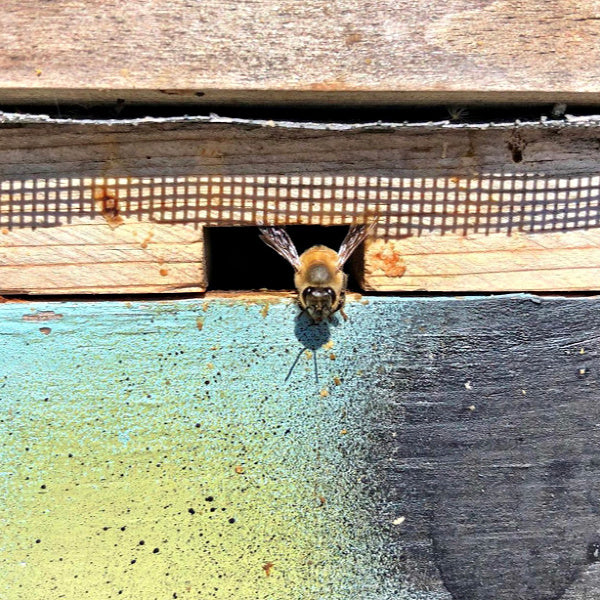Photographs by 2 Queens
Honeybees are easy to love. They’re charming and adorable, buzzing through fields on visits to flowers, right as rain. But they’ve also become a symbol of our interconnectedness and of the holistic nature of the planet. Starting in 2006, beekeepers started reporting a distressing decline in bee populations. Between 1947 and 2008, the number of honeybee hives in the U.S. alone plummeted from about 6 million to 2.4 million, a reduction of 60%, according to U.S. National Agricultural Statistics.
Bees became front-page news, and a grounding in basics facts about these twee pollinators suddenly became de rigueur: three-fourths of the world’s flowering plants and about one-third of the world’s food crops depend on pollinators, including bees, butterflies, moths, birds, bats, and beetles, to live.
The die-off was blamed by scientists on a combination of pesticides, climate change, habitat loss, and parasites. The warnings were simple, but stark: without bees, many people will starve.
In 2008, longtime graphic designer Charles Wilkin found himself captivated by the plight of bees and looking for a challenge. So he joined the estimated 115,000+ beekeepers in the U.S. The process was a wake-up call, Wilkin admits. He and his partner Martin Higgins bought a weekend home in Narrowsburg in 2005, and as they worked on revamping and upgrading their Hudson Valley dream home — “it was a tear-down,” Wilkin admits — Wilkin tended to his new bee family, with mixed success.

Charles Wilkin of 2 Queens

Martin Higgins of 2 Queens
“It was a failure at first,” he says. “It was probably a combination of my inexperience with the common problems bees in general were facing. But I looked at beekeeping as more than a hobby. It was an escape, even a form of therapy for me. I became more and more attached to the bees and invested in their ability to thrive. As I got better [at beekeeping], I began sharing my honey with friends.”
So how did it evolve into a business?
Like the progress Wilkin made with beekeeping, it was slow.
“For four years, I did it as a side project, but, as with anything you’re passionate about, it begins to take up more and more energy, time, and brain space,” he recalls. “I’ve been a graphic designer for my entire professional life, 30 years. So I started designing labels for the honey and giving bottles to my friends and family.”
Then, the demand became so intense, he started bringing his wares to farmers’ markets.
Meanwhile, Wilkin’s partner Higgins supported him and began adding his own touches to the business.
“Martin owned a chain of coffee shops in the 90s, and he missed working with coffee,” Wilkin says.

Shop 2 Queens' 12 oz. bags of coffee beans >>
Higgins’ approach to coffee, and soon tea, was analogous to Wilkin’s with honey. As with honeybees, large-scale environmental concerns have been linked to both coffee and tea production. Terrible working conditions, including child labor, have been widely reported on coffee plantations; coffee production has also been linked to environmental degradation. The same issues shadow tea farms and production.

Shop 2 Queens' loose leaf teas >>
To avoid supporting inhumane businesses, Higgins and Wilkin will only source from fair-trade, organic producers. And, no, they won’t name names.
“I’ll just say we work with well-known importers, with a paper trail of certifications,” Wilkins says. “Martin goes the extra step of going down to their warehouses in New York City and hand sorting through the beans and teas to pick the ones he believes will be the best.”
Soon, their business — which they dubbed 2 Queens — was bursting out of the farmers markets, and their home.
“Martin would spend all week hand-roasting the coffee and sorting the teas on his little hand-roaster at home,” Wilkin recalls. “And it would make maybe 18 bags of coffee and then sell out immediately at the market.”
The honey was flowing out the door, too.
“I started growing my number of hives, and moving them off my land,” Wilkin says. “I partner with organic farms and make sure that the bees, who travel up to three miles a day on their pollinating journey, won’t run into farmers using pesticides. One of our favorite farms is an organic apple orchard, and another is the 50-acres of our conservationist friends who live on the Delaware River.”


With 15 hives in operation and thirsty customers demanding more, they took the plunge and went full-on commercial. With the help of a kick-starter campaign, they were able to buy an industrial coffee roaster and secure an official café space, 2 Queens, in Narrowsburg. In their Catskills shop, visitors will find, in addition to honey, tea and coffee, classes on roasting, fantastic honey-tinged baked sweets, all in a relaxed, chic, and welcoming environment that feels, well, royal.
“It really did come together in an amazing way,” Wilkin marvels. “The bees and the honey never cease to amaze me. The color and flavors change drastically season to season, and we love pairing them with different teas and coffees. The honey coffee latte is also a perennial sell-out at the store.”
What started as a lark — and almost failed — has turned into a thriving, busy, buzzy, online, wholesale, and brick-and-mortar biz (open for take-out only right now) that may just be doing more than its part to help save the bees, and make the world a more safe and just place.
Wilkin credits the bees.

“They are such hard workers,” he says. “Truly the best inspiration for an entrepreneur.”


Leave a comment